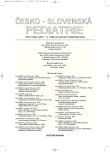-
Medical journals
- Career
Monogenic Hypertension
Authors: Z. Doležel; J. Štarha; F. Jimramovský; D. Dostálková
Authors‘ workplace: II. dětská klinika LF MU a FN Brno přednosta prof. MUDr. Z. Doležel, CSc.
Published in: Čes-slov Pediat 2009; 64 (2): 89-94.
Category: Review
Overview
Arterial hypertension (AH) is a common disorder that affects a large patient population including children. Incidence of AH in childhood is above 1%. Essential hypertension is currently the most common cause of AH in children and is usually associated with overweight or obesity.
Among disorders of secondary hypertension is monogenic hypertension caused by mutation of a single gene. This mutation leads to hyperactivity of renal sodium and chloride transporters or mineralocorticoid receptors dysfunction or dysregulation of adrenal steroids synthesis. Increased rates of sodium and water reabsorption lead to plasma volume expansion and AH. Typically, laboratory findings in monogenic forms of hypertension include low plasma renin activity. Hormonal studies coupled with genetic testing can help in the early diagnosis of these disorders as for pediatrician.Key words:
monogenic hypertension, aldosterone, plasma renin activity, childhood
Sources
1. Seeman T, Dušek J, Janda J. Arteriální hypertenze v dětském věku. Čes.-slov. Pediat. 2003;58(9): 566–578.
2. O’Shaugnessy KM, Karet FE. Salt handling and hypertension. Annu Rev. Nutr. 2006;26 : 343–365.
3. Rowan S, Adrogue H, Mathur A, et al. Pediatric hypertension: a review for the primary care provider. Clin. Pediatr. 2005;44 : 289–296.
4. Lisá L, Kytnarová J, Stožický F, et al. Doporučený postup prevence a léčby dětské obezity. Čes.-slov. Pediat. 2008;63(9): 501–507.
5. Mráz M, Spurný P, Pytliak M, et al. Endotelová dysfunkcia. Čes.-slov. Pediat. 2004;59(6): 311–315.
6. Scott SW. Advances in genetic hypertension. Curr. Opin. Pediatr. 2007;19 : 192–198.
7. New MI, Geller DS, Fallo F, et al. Monogenic low renin hypertension. Trends Endocrinol. Metab. 2005;16 : 92–97.
8. Tobin MD, Tomaszewski M, Braund PS, et al. Common variants in genes underlying monogenic hypertension and hypotension and blood pressure in the general population. Hypertension 2008;51 : 1658–1664.
9. Mosso L, et al. Primary aldosteronism and hypertensive disease. Hypertension 2003;42 : 161–165.
10. Mulatero P, Morello F, Veglio F. Genetics of primary aldosteronism. Trends Endocrinol. Metab. 2004;22 : 663–670.
11. Lafferty AR, Torpy DJ, Stowasser M, et al. A novel genetic locus for low renin hypertension: familial hyperaldosteronism type II maps to chromosome 7 (7p22). J. Med. Genet. 2000;37 : 831–835.
12. New MI, et al. Monogenic low renin hypertension. Trends Endocrinol. Metab. 2005;16 : 92–97.
13. Mulatero P. A new form of hereditary primary aldosteronism: familial hyperaldosteronism type III. J. Clin. Endocrinol. Metab. 2008;93(8): 2972–2974.
14. Štarha J, Doležel Z, Dostálková D. Liddleův syndrom (LS) – neobvyklá příčina arteriální hypertenze. Čes.-slov. Pediat. 2000;55(4): 244–247.
15. Ciechanowitz A, Doležel Z, Placha G, et al. Liddle syndrome caused by P616R mutation of the epithelial sodium channel beta subunit. Pediatr. Nephrol. 2005;20(6): 837–838.
16. Kahle KT, et al. WNK4 regulates the balance between renal NaCl reabsorption and K+ secretion. Nat. Genet. 2003;88 : 372–376.
17. Xie J, Craig L, Coby MH, et al. Role of with-no-lysine [K] kinases in the pathogenesis of Gordon’s syndrome. Pediatr. Nephrol. 2006;21(9): 1231–1236.
18. Mullins LJ, Bailey MA, Mullins JJ. Hypertension, kidney, and transgenics: a fresh perspective. Physiol. Rev. 2006;86 : 709–746.
19. Luft FC. Mendelian forms of human hypertension and mechanisms of disease. Clin. Med. Res. 2003;1(4): 291–300.
20. Šumník Z, Koloušková S, Šnajderová M. Neobvyklá příčina primární amenorey. In Lebl J, Šnajderová M, Novotná D. Kazuistiky z dětské endokrinologie. Praha: Galén, 2001 : 75–76.
21. Geller DS, Farhi A, Pinkerton N, et al. Activating mineralocorticoid receptor mutation in hypertension exacerbated by pregnancy. Science 2000;289(7): 119–123.
22. Rafestin-Oblin M-E, Souque A, Bocchi B, et al. The severe form of hypertension caused by the activating S810L mutation in the mineralocorticoid receptor is cortisone related. Endocrinology 2003;144 : 528–533.
23. Schmider-Ross A, Wirsing M, Büscher U, et al. Analysis of the S810L point mutation of the mineralocorticoid receptor in patiens with pregnancy-induced hypertension. Hypertens. Pregnancy 2004;23(1): 113–119.
Labels
Neonatology Paediatrics General practitioner for children and adolescents
Article was published inCzech-Slovak Pediatrics

2009 Issue 2-
All articles in this issue
- Reflux Strictures of Esophagus in Children – Therapy and Results
- Mental Anorexia or Brain Tumor?
- Vaccination against Tuberculosis
- Genetically Determined Forms of Nephrotic Syndrome in Children
- Flow-mediated Dilation (FMD) – Ultrasound Evaluation of Function of Vascular Endothelium in the Population Groups at Risk
- Monogenic Hypertension
- Czech-Slovak Pediatrics
- Journal archive
- Current issue
- Online only
- About the journal
Most read in this issue- Vaccination against Tuberculosis
- Genetically Determined Forms of Nephrotic Syndrome in Children
- Reflux Strictures of Esophagus in Children – Therapy and Results
- Monogenic Hypertension
Login#ADS_BOTTOM_SCRIPTS#Forgotten passwordEnter the email address that you registered with. We will send you instructions on how to set a new password.
- Career

